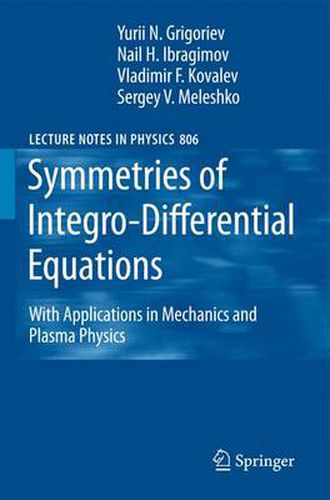Readings Newsletter
Become a Readings Member to make your shopping experience even easier.
Sign in or sign up for free!
You’re not far away from qualifying for FREE standard shipping within Australia
You’ve qualified for FREE standard shipping within Australia
The cart is loading…






This title is printed to order. This book may have been self-published. If so, we cannot guarantee the quality of the content. In the main most books will have gone through the editing process however some may not. We therefore suggest that you be aware of this before ordering this book. If in doubt check either the author or publisher’s details as we are unable to accept any returns unless they are faulty. Please contact us if you have any questions.
The present book is an introduction to a new eld in applied group analysis. The book deals with symmetries of integro-differential, stochastic and delay equations that form the basis of a large variety of mathematical models, used to describe va- ous phenomena in uid mechanics and plasma physics and other elds of nonlinear science. Because of its baf ing complexity the mathematical study of nonlocal equations is far from completion, although the equations have been intensively studied in - merous applications over more than fty last years using both numerical and anal- ical methods. The principal aim of analytical approaches is to obtain exact solutions, admitted symmetries, conservation laws and other mathematical properties, which allow one to make sound decisions in more detailed applied investigations. Classical Lie group theory provides a universal tool for calculating symmetry groups for systems of differential equations. Consequently, group theoretical me- ods appear ef cient in analyzing different phenomena using mathematical models that employ differential equations. However Lie’s methods cannot be directly - plied to integro-differential equations, in nite systems of differential equations, - lay equations, etc. Hence it is natural to extend the ideas of modern group analysis to these mathematical objects that up to recently were not in mainstream of classical group theoretical approaches.
$9.00 standard shipping within Australia
FREE standard shipping within Australia for orders over $100.00
Express & International shipping calculated at checkout
This title is printed to order. This book may have been self-published. If so, we cannot guarantee the quality of the content. In the main most books will have gone through the editing process however some may not. We therefore suggest that you be aware of this before ordering this book. If in doubt check either the author or publisher’s details as we are unable to accept any returns unless they are faulty. Please contact us if you have any questions.
The present book is an introduction to a new eld in applied group analysis. The book deals with symmetries of integro-differential, stochastic and delay equations that form the basis of a large variety of mathematical models, used to describe va- ous phenomena in uid mechanics and plasma physics and other elds of nonlinear science. Because of its baf ing complexity the mathematical study of nonlocal equations is far from completion, although the equations have been intensively studied in - merous applications over more than fty last years using both numerical and anal- ical methods. The principal aim of analytical approaches is to obtain exact solutions, admitted symmetries, conservation laws and other mathematical properties, which allow one to make sound decisions in more detailed applied investigations. Classical Lie group theory provides a universal tool for calculating symmetry groups for systems of differential equations. Consequently, group theoretical me- ods appear ef cient in analyzing different phenomena using mathematical models that employ differential equations. However Lie’s methods cannot be directly - plied to integro-differential equations, in nite systems of differential equations, - lay equations, etc. Hence it is natural to extend the ideas of modern group analysis to these mathematical objects that up to recently were not in mainstream of classical group theoretical approaches.